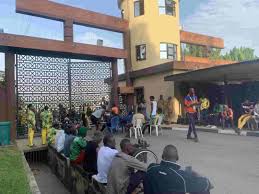A fierce war of words erupted on Thursday between Minister of the Federal Capital Territory, Nyesom Wike, and the FCT’s representative in the Senate, Senator Ireti Kingibe, over the recent mass sealing of properties in Abuja due to unpaid ground rent—an action that has sparked both legal and political firestorms.
The controversy ignited after the FCT Administration, under Wike’s directive, moved to clamp down on property owners who have defaulted on ground rent payments—some for as long as 43 years. The operation saw several buildings sealed, including prominent institutions like Access Bank and even the Peoples Democratic Party (PDP) National Secretariat.
Senator Ireti Kingibe, who is the elected voice of the FCT people, publicly condemned the clampdown, labelling it as “unconstitutional, indiscriminate, and lacking in due process.” In a statement released via her official X (formerly Twitter) handle on May 26, 2025, she criticized the minister’s approach as high-handed and insensitive to Nigeria’s economic realities.
“No Nigerian’s property should be sealed or seized solely on the basis of ground rent defaults,” Kingibe stated, referencing the Land Use Act and the Urban and Regional Planning Act, which she claims do not endorse property sealing as punishment for rent arrears. Instead, she argued that the law prescribes fines or surcharges, not arbitrary shutdowns.
But the Wike camp wasted no time in hitting back.
In a strongly worded rebuttal issued by Lere Olayinka, Senior Special Assistant on Public Communications and Social Media to the FCT Minister, the senator was accused of exhibiting “ridiculous ignorance” of the laws she claims to uphold.
“It is embarrassingly ignorant for a sitting senator not to understand Section 28 of the Land Use Act,” Olayinka snapped. “Ground rent is not a favor—it’s a legal obligation. And refusal to pay it for decades cannot be sugarcoated with politics.”
Olayinka further suggested that Senator Kingibe’s public outrage was less about legality and more about personal vendetta against Wike, urging her to “purge herself of hatred” and stop using the platform of governance to score political points.
Interestingly, the clash unfolds just days after President Bola Tinubu granted a 14-day grace period for all ground rent defaulters—a move aimed at calming tensions and avoiding further disruptions to business activities in the nation’s capital. However, insiders suggest the truce may be temporary, as policy friction between the legislative and executive arms of the FCT appears to be deepening.
Senator Kingibe has since vowed to push for legislative reforms that would enforce strict adherence to due process in enforcement operations, emphasizing that the current method of sealing off properties without court orders or clear procedures erodes public trust.
“While we don’t support lawlessness, we cannot govern by impunity,” she warned.
For now, Wike’s camp remains unmoved, arguing that ownership comes with responsibility, and decades-long defaulters can no longer be tolerated. The question now is: What happens after Tinubu’s 14-day grace period expires?As Abuja residents watch from the sidelines, they are caught between a rock and a hard place—between the need for revenue enforcement and the cry for fairness in governance. One thing is certain: this power tussle in the FCT is far from over.















Leave a Reply